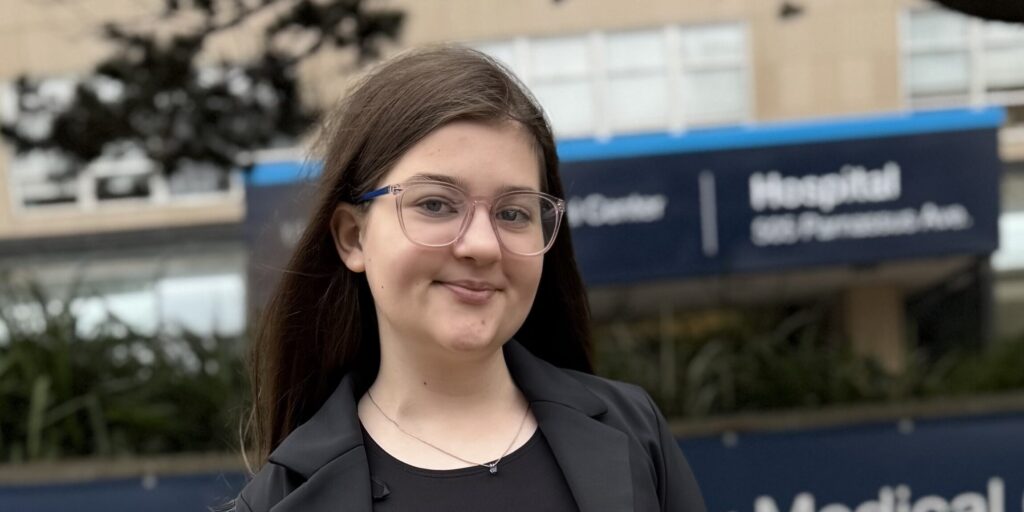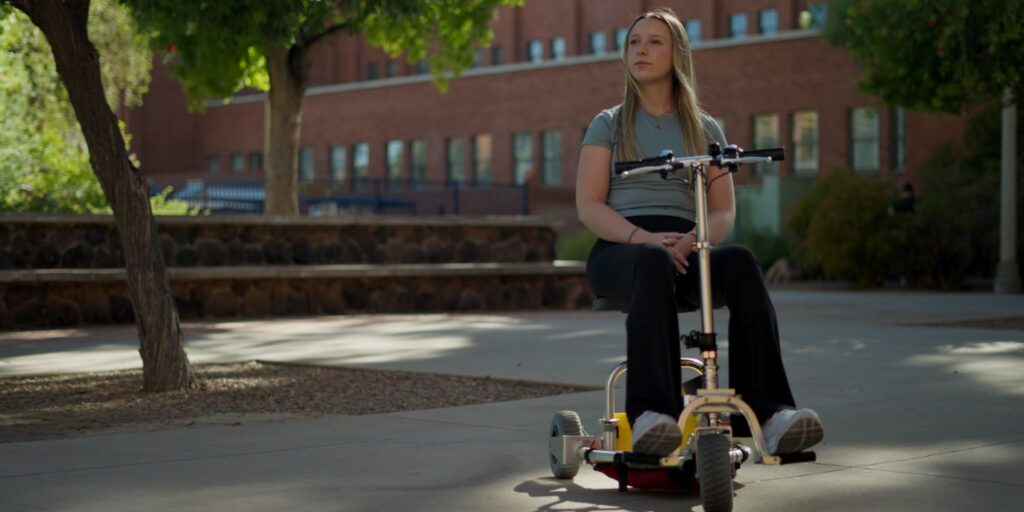
Breaking Barriers in Higher Education: My Journey as a Student with Muscular Dystrophy
By Serena Desiderio | Friday, January 24, 2025
5 Second Summary
MDA’s College Scholarship Program provides support to students living with neuromuscular disease as they pursue their academic dreams. Merit-based scholarships are awarded to students who demonstrate leadership qualities and are making an impact in the neuromuscular community. More information and application criteria can be found at mda.org/scholarship.
Serena Desiderio is a 2024 MDA College Scholarship recipient.
Read more personal stories from members of the neuromuscular community about their College Experience as they share their journey, accomplishments, advice for accommodations and overcoming barriers, and insights into navigating college life with a disability.”
Serena Desiderio, from Gilbert, Arizona, is a senior at the University of Arizona studying Physiology and Medical Sciences with an emphasis in Exercise Physiology and a minor in Psychology. Diagnosed with limb girdle muscular dystrophy at 14 years old, she’s using her experiences and education to pursue a career in physical therapy, hoping to support the neurologic and neuromuscular community. Serena’s journey reflects her commitment to breaking down accessibility barriers on her own terms.
Navigating college life comes with its own unique set of challenges for every student, but as someone living with muscular dystrophy, I quickly learned that my journey through higher education would require a mix of grit, adaptability, and advocacy. I was diagnosed with limb girdle muscular dystrophy (LGMD) when I was 14, and while I faced the reality of my diagnosis, I resolved not to let it define my potential. Now, as a senior at the University of Arizona majoring in physiology and medical sciences, I’m excited to share what I’ve learned and how this journey has helped shape my vision for a career in physical therapy.
Embracing accessibility and independence
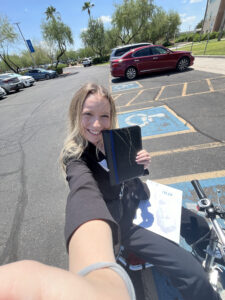
Serena uses her scooter, “Kachow”, around campus
College campuses present obstacles that require creative problem-solving for students with neuromuscular disabilities. From getting around campus on time to navigating buildings that aren’t always as accessible as they should be, each day brings fresh reminders of the importance of accessible design. This past year, I began using my accessibility device, “Kachow,” which is a lightweight scooter that helps me get around campus. It’s been a game-changer, not just for the practical support but for the sense of freedom it’s given me. While it was initially hard to adjust to the visible progression of my muscular dystrophy, Kachow has allowed me to tackle challenges that once seemed daunting, reminding me that embracing the right tools isn’t about “giving in”—it’s about empowering myself to go after my dreams. I won’t sugarcoat it and say that this was an easy transition—it took a lot of self-acceptance and a supportive network of people advocating for me to get to where I am today.
Advocating for accessibility isn’t always easy, and I’ve learned that persistence is key. When I encounter a building or resource that isn’t fully accessible, I don’t hesitate to reach out to campus administration or student services. For any other students with neuromuscular diseases, I can’t stress enough the importance of speaking up. Many universities have resources to increase accessibility for students, but they’re often underutilized. Advocating for myself has helped me access accommodations like accessible classrooms, sporting event accommodations, and even support groups. I was one of the first people at the University of Arizona with a disability to bring forward solutions to accessibility at sporting events. My voice and persistence weren’t just for myself, but also for others with progressive disabilities who want normal experiences just like everyone else. I am happy to say that I fully believe that football and basketball game venues at my university are now more aware and accommodating to those with disabilities.
Finding support and community
One of the most significant factors in my college journey has been the support network I’ve built. Early on, I connected with mentors and peers who share similar experiences, and this has made a world of difference. I joined clubs and honoraries at the university where I met peers with similar interests and career goals as me. Their support has not only encouraged me to keep pushing through academic and physical challenges but has inspired me to offer support to others. If you’re just starting college or feeling isolated, I highly recommend reaching out to campus organizations or online communities that can connect you with peers. Having people who truly understand what you’re going through can turn challenging moments into opportunities for growth.
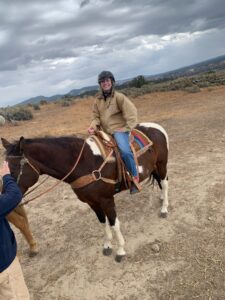
Serena riding a horse
The community I’ve built in Tucson has played a foundational role in my personal growth, inspiring me to dedicate part of my graduate school personal statement to them. One of my favorite excerpts from that piece illustrates a moment when their support meant everything. “I collapse. My legs crumple beneath me and I slam into the concrete floor. I can feel my face turning red and try my best to ignore the pit in my stomach. I crawl on my hands and knees to find a secure spot where I try to stand up, but I can’t. I try to propel myself upward, using the leverage of my hands against the ground to generate the necessary momentum, but instead crash to the floor again. Two of my friends rush to my side and offer their arms. I let them walk me to my car, blinking back tears as a numbness takes over my legs. With each step we take, all I can think about is “what if I fall again?” But I also realized, that I had support and that, quite literally, when I fall they are there to help to pick me up.
This community and the friendships I have built over these four years is something I am forever grateful for. I can’t stress enough how lucky I am to have this community and how important it is to have this in your life. I truly wouldn’t have the strength or the grit to do what I am doing today if it weren’t for the family and community that I have made.
Beyond student support groups, I’ve had mentors who have helped me consider the professional applications of my experiences with muscular dystrophy. I was able to connect with mentors through my major and through core classes. The more often that I went to their office hours, the more time I had to connect with my professors. This created a whole cohort of professors that I consider mentors. They have encouraged me to bring my perspective into a field where I could make a meaningful difference: physical therapy. Through their guidance, I realized that my personal understanding of the physical and emotional aspects of living with a disability would bring unique value to my future patients. With each step I take, I’m more motivated to pursue this path, where I can advocate for others and develop accessible care solutions.
Advice for students with a disability
For students living with a disability, my biggest advice is to take ownership of your college experience. I know it can be overwhelming, but staying proactive is one of the most powerful tools we have. Reach out to the accessibility office as early as possible, explore mobility aids, and don’t hesitate to ask for accommodations. It took me time to realize that seeking help or using assistive devices like AFO braces or Kachow doesn’t make me less capable—it gives me the strength to keep pursuing my goals.
Don’t be afraid to lean on others when needed. College can be a balancing act, and I’ve found that trusting friends and mentors has only enriched my experience. Sharing the load with people who genuinely care for me has made it easier to focus on what truly matters: my education and my passion for helping others.
Looking to the future
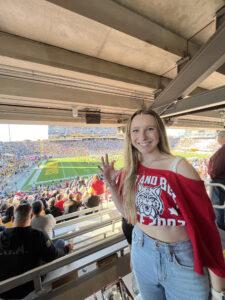
Serena at a college football game
My journey in higher education has made me more determined than ever to help others in the neuromuscular community. The challenges I’ve faced have shaped my ambition to become a physical therapist, where I’ll be able to combine my knowledge with a personal understanding of disability to provide compassionate and accessible care. I want to be a voice for accessibility in health care and show others that no matter the challenges they face, there’s always a path forward.
To anyone with a neuromuscular disease thinking about higher education: embrace the journey. Every challenge, every step forward, is a testament to your strength. You’re not defined by your diagnosis, but by the passion and determination you bring to each goal. And remember, you’re never alone. There’s a vibrant community of us out here, cheering you on every step of the way. I am and always will be your biggest cheerleader.
Next Steps and Useful Resources
- More information and application criteria for the MDA’s College Scholarship Program can be found at mda.org/scholarship.
- For more information about the signs and symptoms of Limb Girdle muscular dystrophy (LGMD) , as well an overview of diagnosis and treatment concerns, an in-depth review can be found here.
- MDA Community Education empowers the neuromuscular disease (NMD) community through high-quality educational programs and materials. Learn valuable skills for overcoming common barriers in Access Workshops, get up-to-date information from experts in the field and connect with other families at Engage Symposiums, print out educational materials, and more.
- MDA’s Resource Center provides support, guidance, and resources for patients and families. Contact the MDA Resource Center at 1-833-ASK-MDA1 or ResourceCenter@mdausa.org
- Stay up-to-date on Quest content! Subscribe to Quest Magazine and Newsletter.
Disclaimer: No content on this site should ever be used as a substitute for direct medical advice from your doctor or other qualified clinician.




